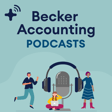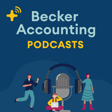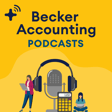
Balancing the Future Ep. 27 - Empowering Communities Through Accounting and Leadership with Shakor J. Jukes
Shakor J. Jukes, honored as an “Outstanding 40 Under 40” CPA, joins host Chris Mitchell to demonstrate how accounting goes far beyond spreadsheets. He recounts growing up in Newark’s inner-city, discovering accounting in high school, and pushing through repeated CPA-exam setbacks. Now a champion of financial literacy, Jukes details the essentials that turn paychecks into generational wealth. Join us for his important message of how mastering the language of money and giving it back to your community can make the CPA designation a tool for lasting social change.
Earn CPE by listening to this podcast through a Becker Prime CPE subscription.
Listen to this episode through your Becker LMS platform to complete practice questions, pass the final exam, and earn CPE credit.
Already a Becker Prime CPE customer? Login here.
Have access to Becker CPE through your employer? Earn CPE credit for this podcast however you consume Becker CPE, either through your company’s LMS or via the Becker platform. Not sure where to log in? Check with your CPE admin.
Learn more about CPE Podcasts from Becker: https://www.becker.com/cpe/becker-podcasts


